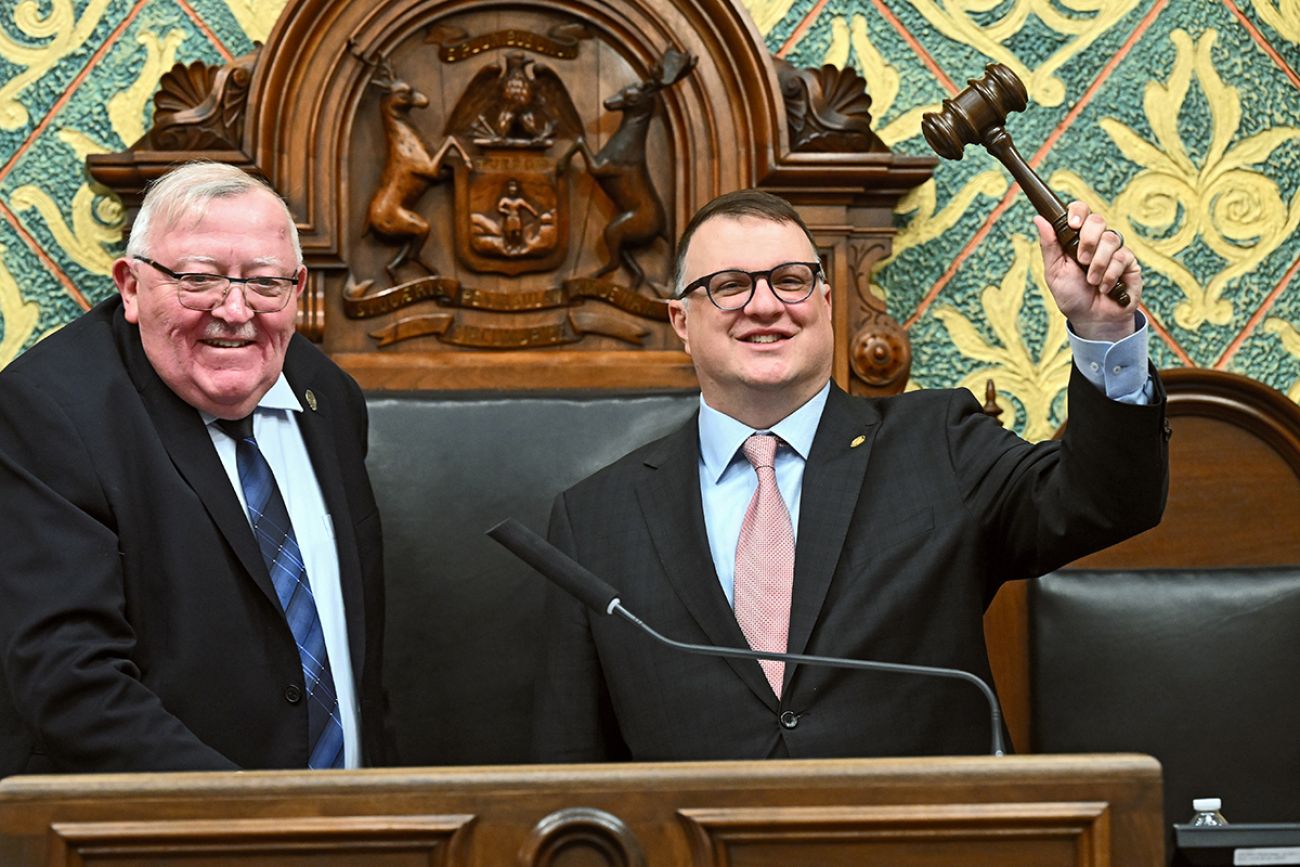Michigan House GOP leader on FOIA reform: 'Don't get your hopes up'

- New House Speaker Matt Hall says not to expect “fast action” on bills to open the governor, lawmakers to public records requests
- Instead, Hall says he wants to end the lawmaker-to-lobbyist pipeline and reform the state’s earmark process
- Michigan is one of two states to not let residents request public records from either the governor’s office or Legislature
LANSING — Michigan remains one of only two states that fully exempts the governor and lawmakers from public records requests, and new House leadership appears uninterested in immediately changing that.
House Speaker Matt Hall, R-Richland Township, told reporters during a Thursday roundtable that expanding the state's Freedom of Information Act is not a top priority for him as he begins the new two-year session.
"You're not going to see fast action on the FOIA stuff from me in the House,” he said. “You're just not.”
Hall’s comments came one day after bipartisan bills were reintroduced in the Democratic-led Senate to expand Michigan's FOIA law — which already requires most other state and local officials to produce public records upon request — to the governor's office and Legislature.
Related:
- Michigan Democrats’ pension, retirement bills in limbo amid GOP ‘legal review’
- Transparency time? Michigan House plans oversight, Senate pushes public records
- See what Michigan laws take effect this year: Paid sick days, wage hikes, more
- Michigan House kills hundreds of bills. See what died on final day of Dem control
The same legislation passed the Senate last year with wide and bipartisan support but was not put up for a vote by then-House Speaker Joe Tate, D-Detroit, before the term ended.
Hall said he is focused on other transparency and good-government measures, including:
- Earmark reform: New House rules adopted under Hall will require lawmakers to disclose any earmarks they sponsor before votes on budget bills. Michigan lawmakers have loaded recent state budgets with billions of dollars in "enhancement grants" to support pet projects in their districts, including some controversial measures that have prompted criminal investigations.
- Cooling off: Hall said he believes in "ending this revolving door" of lawmakers who leave office and immediately become lobbyists. He noted a previous proposal for a two-year “cooling off” period.
- Lame-duck guardrails: Hall said he wants to make it harder to "just ram through unpopular votes without committee hearings in the middle of the night after an election." He cited a previous proposal to require two-third majority support to pass bills in a lame-duck session.
“I think those are bigger issues than FOIA, because those are issues about billions of dollars of your tax dollars — the public,” Hall said, later adding: "I'm actually going to do these things.”
As for the public records legislation, Sens. Jeremy Moss and Ed McBroom — a Democrat and Republican, respectively — have been working on their bills for a decade, including earlier versions that Hall personally voted for in 2021 and 2022.
“For 10 years, these guys have come up with a sales pitch to you in the media that they're going to do this, and you guys have bought it for 10 years,” Hall said.
“I would just encourage you guys don't get your hopes up too much, OK? They're all politicians.”
Hall spokesperson Greg Manz later clarified in a statement that Hall was not referring to Moss and McBroom, but rather politicians in general.
“Speaker Hall gives a lot of credit to the sponsors of FOIA reforms for making an honest effort — it’s the other Lansing politicians who tend to embrace it and declare it definitively will get done, simply for political cover, that are the problem,” Manz said.
During Thursday’s roundtable, Hall accused the media of “lobbying” for the public records legislation, but Senate sponsors have championed their bills as a means for the general public to learn more about how their government works.
“Michiganders deserve honest, ethical and transparent representation,” Moss, one of the sponsoring lawmakers, said Wednesday on social media after reintroducing the legislation. “Let’s finally get this done.”
Attorney General Dana Nessel, a Democrat who has advocated for government transparency legislation, said earlier this week she thinks the best hope for reform may be a citizen-led ballot initiative.
See what new members are saying about why they donated to Bridge Michigan:
- “In order for this information to be accurate and unbiased it must be underwritten by its readers, not by special interests.” - Larry S.
- “Not many other media sources report on the topics Bridge does.” - Susan B.
- “Your journalism is outstanding and rare these days.” - Mark S.
If you want to ensure the future of nonpartisan, nonprofit Michigan journalism, please become a member today. You, too, will be asked why you donated and maybe we'll feature your quote next time!




